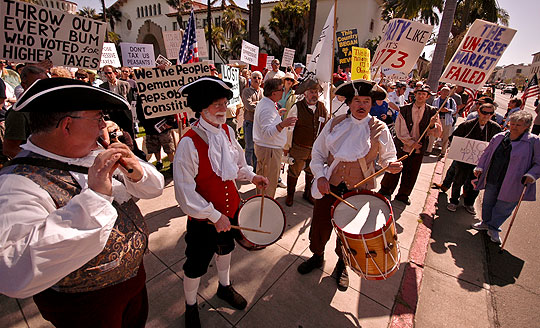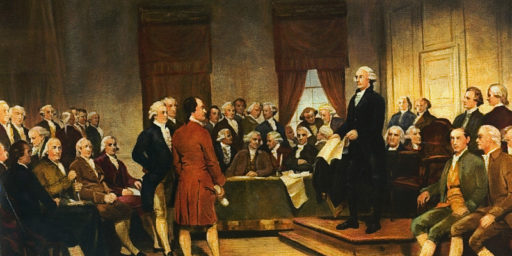The GOP Dilemma: Tea Party Not Representative Of America As A Whole
According to a new poll, the Tea Party movement, which is largely now the base of the GOP, is not completely in step with the views of American voters as a whole.
According to a new poll, the Tea Party movement, while a substantial force inside the Republican Party, is not representative of the American people as a whole:
According to an Associated Press-GfK Poll this month, 84 percent who call themselves tea party supporters don’t like how President Barack Obama is handling his job – a view shared by just 35 percent of all other adults. Tea partiers are about four times likelier than others to back repealing Obama’s health care overhaul and twice as likely to favor renewing tax cuts for the highest-earning Americans.
Exit polls of voters in this month’s congressional elections reveal similar gulfs. Most tea party supporters – 86 percent – want less government intrusion on people and businesses, but only 35 percent of other voters said so. Tea party backers were about five times likelier to blame Obama for the country’s economic ills, three times likelier to say Obama’s policies will be harmful and twice as apt to see the country on the wrong track.
These aren’t subtle shadings between tea party backers and the majority of Americans, who don’t support the movement; they’re Grand Canyon-size chasms.
With Republicans running the House next year, the findings highlight the delicate dance facing leaders who will have to address tea party concerns without alienating moderate voters who will be crucial in 2012, when the GOP hopes to win the White House and boost its strength on Capitol Hill.
One certainty: There are too many tea party supporters for politicians to ignore, especially for Republicans. About 3 in 10 adults in the AP-GfK Poll call themselves tea party backers, including 60 percent of Republicans. In the exit poll in this month’s election, which saw high conservative turnout, 4 in 10 voiced tea party support, and 2 of every 3 GOP votes came from them.
(…)
The poll also shows sharp differences between the tea party and the 7 in 10 independents who don’t support the tea party, a group both parties will target in 2012. Tea party backers take a far more negative view of Obama and his agenda than those independents do and are far likelier to think favorably of the GOP and unfavorably of Democrats.
Tea partiers are likelier to be white, male, older and more affluent than everyone else, the polls show – groups that tend to be more conservative. Yet even compared with the 47 percent of conservatives who don’t back the tea party, the views of conservatives who do support the movement stand out.
Among conservatives who are tea party backers, 74 percent are glad Republicans will run the House next year while Democrats retain control of the Senate and White House. Just 36 percent of conservatives who don’t back the tea party agree that divided government will be good for the country, likely because of concern over gridlock. Tea party backers are also far likelier than other conservatives to like Palin, the former Alaska governor.
All of this poses a bit of a problem for the Republican Party, and is likely to require somewhat of a delicate balancing act for whoever ends up being the nominee in 2012 if they want to succeed. It seems fairly clear at this point that no candidate is going to make it through the GOP primaries without appealing to the Tea Party movement. While they aren’t necessarily a majority of GOP voters, they are a sizable and, more importantly, politically active minority to the point where it’s hard to see how any candidate that “the movement” finds unacceptable can win the nomination at all. For all intents and purposes, the GOP is the Tea Party, at least for the foreseeable future.
In appealing to the Tea Party base, though, any Republican candidate is going to have the same problem that any other nominee would have after a grueling primary process that required them to run to the right. The General Election campaign will require them to move to the center, and that means the GOP needs to steer clear of controversy:
GOP pollster Steve Lombardo says it will be a challenge for Republican leaders to find policies that will deliver “a two-fer for independents and more extreme elements” of the party. He and other Republicans say the answer is to focus on areas of broad agreement like curbing federal spending, taxes and deficits.
Based on the exit polls, it seems the GOP would do better to concentrate on what actually drove voters to the polls earlier this month, the economy:
The problem with this part of Ponnuru’s hypothesis is that it isn’t supported by the exit polls:
The results underscored the economic distress defining the 2010 election. Eighty-nine percent of voters said the national economy’s in bad shape — nearly as many as the record 92 percent who said so two years ago. What changed is the direction of their ire: In 2008, 54 percent of such voters favored Barack Obama. This year, 55 percent backed Republicans for the House.
Health care came back as the second most important issue at 19%. All other issues were in the single digits.
Additionally, at least one post-election poll suggests that the budget deficit and debt aren’t as big an issue for the general public as some in the GOP might think:
For all the recent frenzy over reducing the deficit, a new poll by CBS News shows that only 4% of Americans consider it the biggest problem faced by the country.
Respondents were asked: “Of all the problems facing this country today, which one do you most want the new Congress to concentrate on first when it begins in January?”
56% of respondents said Congress should focus on the economy and jobs 14% said health care, while only 4% said the budget deficit and national debt. Immigration, education, wars in Iraq or Afghanistan, and taxes each got 2%, while 9% said other.
Federal spending and the debt are important issues, but it seems fairly clear that they are far more important to the Tea Party movement than they are to the public as a whole. The idea that there’s some kind of broad political consensus on those issues isn’t supported by the available evidence. That’s not saying that Republicans shouldn’t attack debt and spending issues over the next two years, of course, but the danger they face this time around is similar to the one they faced in 1994. By concentrating on issues that are important to their base, they are in danger of ignoring what’s important to the public as a whole. Much like 2008, this election was primarily about one thing, the economy. If Republicans forget that, they’ll suffer the same fate Democrats did three weeks ago.
In its efforts to placate the Tea Party, the GOP may find itself losing touch with the voters it needs two years from now.






Not that I’m a fan of the Tea Party, but isn’t the suggestion that America is homogeneous enough that any party could be representative of it kind of odd?
Surprise! There are actual differences of opinion in the country.
George, how many parties define themselves as the “real Americans?” and want to “take our country back?”
I guess that’s the frustration I feel as a moderate. Is the Tea Party suggesting policies, or telling me that I don’t count?
I agree, George. I can’t think of single political group that is representative of America as a whole.
Additionally, while the Tea Party may be viewed as ultra conservative, their presence has helped two GOP-centrists, Scott Brown (MA) and Mark Kirk (IL), take formerly Democratic seats in the Senate.
“Tea Party Not Representative Of America As A Whole”
Hmm….This also seems to be the problem with Libertarians, libertarians, and those who just want to be left alone by government.
The reason we are having such rabid internal fighting is because this nation abandoned our Constitutional principles, so now we have factions fighting to see who will be in control for a couple of years. Central control has left us all in a perpetual fight for domination so that our personal Ox isn’t gored.
Other than a handful of people living out in the woods, drinking tea made out of bark, are there really people who “just want to be left alone by government”?
The irony of “Government hands off my Medicare!” has been pointed out regularly. Most libertarians are fine with patents and copyrights (government-secured monopolies) or wills (only enforceable with government).
The purpose of the Constitution isn’t to ensure that people will be left alone by government. It is to define the parameters under which government will intervene. There’s a reasonable, legitimate, long overdue debate to be had over how those parameters can and should be revised.
Dave, it’s similar to Sarah Palin’s side in the California water controversy. We have a government built water system. Dams. Aqueducts. We balance their use for various interests in the state.
Palin is with farmers who want “their” water from that system. And I quote:
“Fletcher then told of an almond farmer who is now forced to spend $600,000 digging his own well.”
God forbid that a Tea Party farmer would have to dig his own well.
Read more: http://newsbusters.org/blogs/brad-wilmouth/2009/03/31/abc-judge-cuts-water-california-farmers-save-endangered-fish#ixzz16DFb17bP
“In its efforts to placate the Tea Party, the GOP may find itself losing touch with the voters it needs two years from now.”
The GOP needs to worry primarily about getting in touch with the people, not losing touch. And it will be extraordinarily difficult for them, given the fact that they just won a big victory, and thus will find it hard to resist the notion that they already are in touch with the people. All the polling shows however, that they are not, and that they were actually less popular than the Dems, even though the people apparently felt the Dems needed a slapping-down.
There will be a relentless push to the extremes in the GOP, as all the presidential candidates woo the activist extremist wing. 2012 will be a disaster for them, which is why the A-team of candidates will be waiting for 2016.
This Tea Party thing…not such a bright idea after all?
I’d guess all of them? Certainly the democrats and republicans both claim to speak for the majority of Americans, and both speak in terms of taking the country back from the (evil) other.
Some of which is probably just standard political posturing – a message of “most Americans disagree with us” isn’t really a selling feature in national politics.
I really think “take our country back” is different than “speaking for” that country. YMMV.
Not so sure the difference is more than semantics. All the parties want to mold the country to fit their image of how it should be, and none of them believe the country currently fits that mold. The democrats want to take it back to a vision of what it was like under FDR, the GOP to some vision of what it was like under Reagan, and the Tea Party to some vision of what it was like just after the revolution … they’re mainly distinguished in that their vision is even further removed from any reality than the two main parties.
I think the difference between “speaking for” and “take back” is how you are accepting majority views. When you aspire to “speak for” you try to find values which overlap the ‘party’ and ‘majority’ sets. When you “take back” you reject the accepted majority or mainstream.
(I am not a Dem, but I can’t really believe many of them are in the FDR mold these days. After the fall of the Soviet Union everyone moved right. There was actually a dangerous idea that everything left-of-center <i>in America</i> had been rejected. That’s silly of course, because most of our left-of-center was “right” as far as the rest of the world, USSR included, was concerned.)
“Not so sure the difference is more than semantics. ”
Nope, the difference is quite real. Conservatives use the “real American” meme. Quite galling for some of us. When you have served your country and watched young men die in foreign lands, to be told you are not a real American because you think a top marginal rate of 39.6% is ok is irritating. I suppose this happened in American politics in the past, but within my lifetime it is almost entirely confined to conservative rhetoric.
Steve
Most of those polled who say they do not identify with the tea party have a distorted view of the movement, thanks to an ever attacking liberal media. When folks take the time to really see what the tea party represents, they overwhelmingly support it. You can see this very misrepresentation is this article – making the assumptive, based on one poll, that the tea party is some radical far right thing. Interesting that the extreme far left agenda of the Democrats is not considered radical, particularly when you start taking a close look at who drives this agenda. Furthermore, to suggest that this election was “primarily about one thing, the economy”, ignores the reality that is was as much about repudiating the radical far left agenda as it was the economy. More propaganda by the complicit…fortunately, more Americans are awake to the truth now than ever before. Which is what is really driving the left wild!
Tom T,
Did you read this post or the polling it referenced?
Who is stupid enough to think that any political party should represent ALL Americans? Political parties are about gaining power so you can effect change. What change can everyone agree upon? Nothing. The American TEA Party movement must present voters with issues and goals. It is up to the voters to ratfy them or not.
60% of Americans consider themselves to be Conservative or Very Conservative, according to George Washington University’s “Battle Ground Poll”. This is fortunate for the TEA Party, but those Conservatives do not always vote for the Republican Party or vote at all. That seems to be changing. The TEA Party is forcing people to choose. Meanwhile, Obama’s radicalism is causing the ordinary Americans to recoil from the Democrat party.
A political realignment is taking place. It’s anyone’s guess as to what the parties will look like in ten years. Will the Democrat Party become defunct? Will the Leftists take over the Republican party when a Conservative Party is formed around the TEA Party movement? Who knows?
We live in interesting times. We are under extra ordinary stress: an unending poor economy, a debouched dollar leading to high price inflation, an over reaching Federal Executive grasping for ever more power. Obama won’t be able to ram things through the next Congress. So, will he rule by imperial decree? It seems likely that he or his bureaucracy will attempt it. Will he dare the Congress to impeach him? All this would be high drama is it didn’t lead to so many people being hurt.